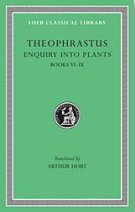 In my review of A Natural History of the Senses I referred to an old treatise by Theophrastus called De Odoribus, or 'Concerning Odours'. It deals with the use of fragrant raw materials in Ancient Greece — how they were mixed with wine, used to scent bedsheets, and as ointments for the body. It's one of two minor works in the author's Enquiry into Plants that are not strictly about botany (the other one being a treatise on 'weather signs'). I'll give a short description of the work as a whole, followed by a brief insight in Theophrastus' thoughts on perfumery.
In my review of A Natural History of the Senses I referred to an old treatise by Theophrastus called De Odoribus, or 'Concerning Odours'. It deals with the use of fragrant raw materials in Ancient Greece — how they were mixed with wine, used to scent bedsheets, and as ointments for the body. It's one of two minor works in the author's Enquiry into Plants that are not strictly about botany (the other one being a treatise on 'weather signs'). I'll give a short description of the work as a whole, followed by a brief insight in Theophrastus' thoughts on perfumery.
Enquiry into Plants originally consisted of ten treatises (nine of which have survived the Middle Ages) and is widely considered as a seminal work in pre-modern taxonomy. It's not exactly clear when the books were written: the oldest print in Greek known today dates back to 1497 (printed in Venice by Aldus Manutius, the man who gave us italics), but the version used in the modern Loeb Classical Library series is based on editions by Wimmer (1862) and Didot (1866).
The work is divided in two: the first volume covers the first five books, and is only worth reading if you want to understand how plants were classified in ancient Greece. Language purists will appreciate the fact that the Greek text is printed on the left page; I can't tell you to what extent the translation reflects the source, but I should warn you that the English text is 80 years old, and that it hasn't been edited for contemporary readers. Personally, I think it's a charming read.
Volume two is the one you need to look out for, as it contains the treatise 'Concerning Odours'. Skip books VI to IX (unless you're interested in under-shrubs, pot-herbs, summer crops, or aromatherapy) and go straight to page 327, where it starts with an introduction to odour classification. Theophrastus makes a philosophical distinction between "good" and "evil" smells, pointing out that descriptors like "pungent", "powerful", "faint", "sweet" and "heavy" can apply to both categories, while "putrid" is just bad, period. Things produced by decaying matter don't smell bad (mushrooms), but decaying matter itself stinks; to which the author adds:
To speak generally then, things that have been cooked, delicate things, and things which are least of an earthy nature have a good odour, [...] and it is obvious that those of an opposite character have an evil odour. But, even as many things pleasant to the taste present a certain bitterness, so many things that have a good odour have a kind of heavy scent. (p. 329)
Theophrastus devotes a short paragraph to the link between smell and taste. His comments are obviously based on empirical observation, and should be taken for what they are; nevertheless, there's great added value in his examples. In this particular paragraph, for instance, he refers to the sweet taste of Phoenician cedar, which doesn't smell nice when you chew on it.
There are many interesting passages on the use of fragrant materials in everyday life that are really worth reading; I could quote them all here, but I'll limit myself to a personal favorite in this treatise. It's where the author discusses the properties of certain perfumes, and how they relate to masculinity and femininity. In his own words:
The lightest [perfumes] are rose-perfume and kypros, which seem to be the best suited to men, as also is lily-perfume. The best for women are myrrh-oil, megaleion, the Egyptian, sweet marjoram, and spikenard: for these owing to their strength and substantial character do not easily evaporate and are not easily made to disperse, and a lasting perfume is what women require. (p. 365)
Clearly, then, there was some sort of gender divide in Greek culture; in fact it was not much different from the situation in Western Europe in the 18th century, when men were expected to smell of fresh, clean barbershop smells like lavender, while women had a slightly broader range to choose from.
The text contains notes from the translator, which are quite handy when you come across product names like megaleion and kypros that no longer exist. I've made a complete transcription of Concerning Odours, which can be found in the Excerpts-section of ScentedPages, but I left out the footnotes. To appreciate this curious ancient treatise in all its glory, you can obtain your new copy from the Loeb Classical Library-series (Harvard University Press) for around US $30.
Theophrastus: Enquiry into Plants (volume II)
Cambridge, Massachusetts: The Loeb Classical Library / Harvard University Press
Two volumes; translated by A.F. Hort (1926)
Theophrastus of Eresus (c. 372 - c. 287 B.C.), also known as Theophrastus of Athens, was a disciple of Aristotle. He became his successor at the Athenian Lyceum, which he presided over for 35 years until his death. Other notable works by Theophrastus are On The Causes of Plants, and a book on morals entitled Characters.
Leave a reply
You must be logged in to post a comment.